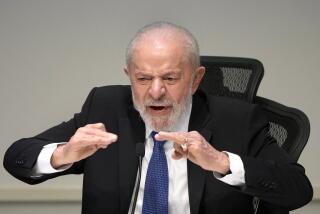Chavez Scorns U.S. Call for Early Elections
- Share via
CARACAS, Venezuela — President Hugo Chavez on Saturday rejected a White House call for early elections, as hundreds of thousands of his opponents held a massive march through this capital.
During a televised interview, Chavez criticized an appeal Friday by the Bush administration that the country move up elections, saying the Venezuelan Constitution won’t permit a new vote on his rule until August, halfway through his term, which is scheduled to end in 2007.
“I don’t believe that the government of President Bush is telling the world that Venezuela must violate its constitution,” Chavez said in a separate interview with The Times and other foreign reporters. “Here no one, no state power has the ability to call early elections.... What I would recommend is that Washington review our constitution.”
But a U.S. official defended the idea of early elections, rejecting criticism that it amounted to encouraging the country to violate its own laws.
The official said a 13-day-old nationwide strike had pushed Venezuela to the brink of a crisis that could result in violence. A similar protest in April led to a coup that overthrew Chavez, but he was restored to power two days later by loyal troops.
“It’s not sufficient for the government to sit on institutional legitimacy when the country is at risk,” said the official, who asked not to be identified. “What we were trying to do was send a very clear signal that the situation is so desperate and the potential so grave for confrontation and violence that both sides need to be prepared to think about this a little bit.”
Venezuela’s conflict pits Chavez against a determined array of opponents, including businesses, unions, dissident military officers and civic groups.
The opposition wants Chavez to resign or hold new elections within the first three months of next year. Chavez said that the country must wait until August to vote on his rule.
The strike has hobbled oil production in the United States’ third-largest oil supplier, cutting daily production from about 3 million barrels to between 500,000 and 700,000. There also have been gasoline and food shortages, leading to concerns of street riots.
On Saturday, hundreds of thousands of people blocked the main highway running through central Caracas, in a human flood that waved yellow-blue-and-red Venezuelan flags, beat drums and called for Chavez’s resignation.
Chavez administration officials have responded to the strike by trying to break it, saying they will import gasoline and pay for foreign oil workers to run the nation’s oil industry. That, in turn, has led to fears of a prolonged work stoppage that would further impoverish this already poor country.
For the first time Saturday, the state oil company’s top official recognized that the strike was succeeding in shutting down production.
“In good measure, it’s paralyzed,” said Ali Rodriguez, president of Petroleos de Venezuela, or PDVSA. “The government remains firm, but the country has been severely punished. If this is the triumph they want to proclaim, well, it’s a sad triumph.”
With talks to resolve the impasse stalled, the U.S. last week stepped up pressure for a resolution, sending Thomas Shannon, a deputy assistant secretary of State, to Venezuela to meet with the country’s foreign minister and calling for moved-up elections.
That idea hit an especially raw nerve in the Chavez administration, because the U.S. had appeared to tacitly endorse the coup in April when it did not immediately condemn his overthrow.
Foreign Minister Roy Chaderton, one of the most moderate members of Chavez’s Cabinet, said in an interview Saturday that the White House didn’t have “a full grip of what’s going on in my country.”
“It was an expression of concern for Venezuela, but we are also concerned for Venezuelan democracy,” he said.
Chaderton said that before the constitution can be amended, a new national electoral council must be voted in. The current council is dominated by opposition members.
“In whatever democracy, if the tribunal is biased, [elections] are not fair at all,” he said.
Chaderton also said the government would put on the table a proposal that the fiercely anti-Chavez media tone down their confrontational tactics and provide more air time to the government.
Venezuela’s major television stations and newspapers have been making little effort to be objective, saying Chavez has forced them to become a voice for the opposition. Physical attacks against government supporters often land on the back pages.
The reverse applies to the state-run television networks and radio stations, which routinely ignore opposition marches and run ads mocking anti-Chavez protesters.
More to Read
Sign up for Essential California
The most important California stories and recommendations in your inbox every morning.
You may occasionally receive promotional content from the Los Angeles Times.













